Estimated reading time: 7 minutes
Cats lick blankets for various reasons: they may find comfort in the texture or scent, it can mimic early kittenhood suckling, or they might be drawn to residues from laundry products. However, consistent blanket licking can also indicate stress, a condition called pica, or other health concerns. While often a harmless behavior, it’s essential for cat owners to understand and monitor the underlying reasons.
Cats sometimes lick inedible items throughout the house, including blankets. As a cat owner, you might wonder, “Why does my cat lick my blanket?” Is this a sign that your cat feels stressed or is it simply a quirky behavior?
It’s important to keep an open mind as we delve into the possible reasons for this behavior. Whether your cat is a weeks-old kitten or an older feline, the act of licking a blanket might be more common than you think. Let’s explore what drives many cats to develop this intriguing habit.
The Basics of Licking Behavior in Cats
The world of feline behavior is vast and often mysterious. Many cats, from the playful kitten to the seasoned kitty, have habits that intrigue their owners. One such behavior is the act of licking fabric, especially blankets. But why?
Firstly, it’s normal for cats to lick. They groom themselves or lick their kin to express affection and maintain cleanliness. Licking a blanket or other fabrics might be an extension of this grooming behavior. Their sense of smell and texture recognition plays a crucial role here. A favorite blanket, for instance, might carry the scent of its owner, leading the cat to lick and knead it.
Cats also display behaviors from their early life. Kittens suckle and knead their mothers, usually when just a few weeks old. If separated from their mothers too early, cats sometimes lick and even suck on blankets because it reminds them of this comforting act. This behavior can continue into adulthood, especially if the blanket feels or smells comforting.
Top Reasons Cats Lick Blankets
Many cats, at one point or another, develop the habit of licking blankets. Understanding the reasons behind this can help a cat owner provide better care and comfort. Here are the top reasons:
Comfort and Security
As mentioned, kittens who are separated from their mothers too early might suck on blankets to replicate the suckling they did when younger. This brings comfort and security.
Texture Attraction
Some blankets have textures that cats find irresistible. The feeling under their tongue might be satisfying, leading them to lick and knead the fabric continuously.
Scent
A cat’s sense of smell is keen. If your blanket carries a particular scent, whether it’s yours or something else they find comforting, they might start licking it.
Pica
Pica is a condition where cats (or even people) eat inedible items. If a cat is obsessed with licking and even eating pieces of the blanket, it could be a sign of this condition.
Attention-Seeking
If a cat notices that licking a blanket gets your attention, especially if you react strongly to it, they might do it more. Cats love a reaction, after all!
Stress or Health Issues
Sometimes, the act of licking non-stop could be a sign that something is wrong. If a cat is sick or stressed, they might resort to behaviors like this as a coping mechanism.
If you suspect your cat has a health issue like pica or another underlying problem leading to excessive licking, it’s crucial to consult a vet. While some reasons are harmless quirks, others might need attention and care.
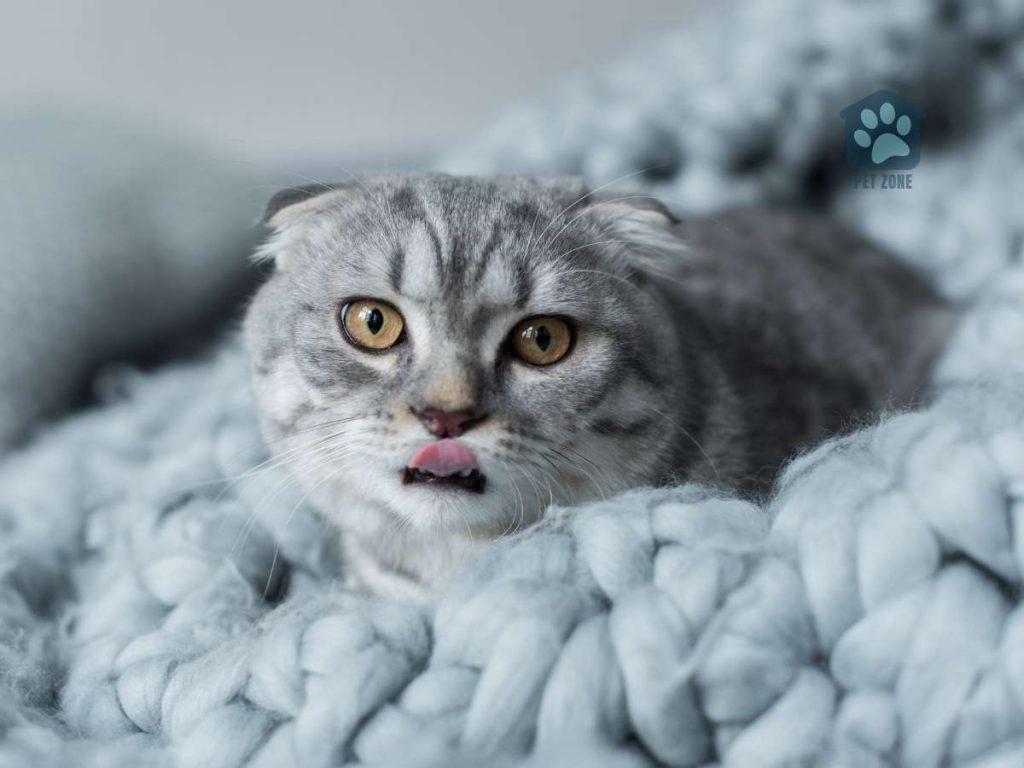
Blanket Licking vs. Other Fabrics
Every piece of furniture or fabric in a home might tell a story for our feline friends. But there seems to be a particular allure when it comes to blankets. Let’s uncover why:
Blanket Material
Certain fabrics are more appealing to cats. Soft, plush blankets might mimic the fur of their mothers, encouraging your cat to lick and suckle.
Familiarity
Blankets, especially those on beds or sofas, are frequently used items. This means they might hold more of the scents cats love. So, while a cat could be drawn to other fabrics throughout the house, blankets often win due to their familiar and comforting scents.
Blankets as Play Items
Many cats use blankets as well for play. Hiding under them, pouncing on lumps, or chasing moving feet beneath them! A play session with a blanket could easily lead to a licking session, especially if the cat becomes relaxed afterward.
Blanket’s Accessibility
Blankets are usually at a location where cats can easily access them. Unlike some other fabrics or items that might be out of reach, blankets are readily available for a quick lick or knead.
Oriental Cats
Some breeds, like oriental cats, have a higher tendency to exhibit fabric licking behaviors. If you own one of these breeds, you might find them gravitating towards blankets more than other items.
If your cat licks other items apart from blankets, it’s important to note any patterns or preferences they might have. It can give clues about their likes, dislikes, and even their well-being.
Concerns with Blanket Licking
Cats and their quirks can be endearing, but sometimes, it raises eyebrows and concerns. Here’s when and why you should pay closer attention to your cat’s blanket licking:
Excessive Licking
If a cat spends an unusual amount of time licking a blanket, it might be more than just a quirky behavior. It could mean your cat is trying to cope with stress or an underlying health issue.
Eating the Fabric
If a cat starts to chew and swallow parts of the blanket, this could be a sign of pica. Cats with pica eat inedible items, and this can be harmful. If you notice this behavior, consult a vet promptly.
Changes in Behavior
If your usually social cat starts spending more time alone, licking blankets, and displaying other changes in behavior, it could indicate something is wrong. It’s always a good idea to get them checked.
Licking After Exposure to Chemicals
If you’ve recently used a new laundry detergent, cleaning solution, or even a new fabric softener, and suddenly notice your cat licking the blanket more, they could be reacting to these chemicals. Ensure all fabrics your cat has access to are safe and free from harmful residues.
Obsession Over One Blanket
While cats might have favorite spots or items, an obsession over one blanket to the exclusion of all other activities might warrant a closer look.
As a responsible cat owner, it’s important to keep a close watch on any behavior that seems out of the ordinary. While blanket licking can be normal, excessive or obsessive behavior should be addressed.
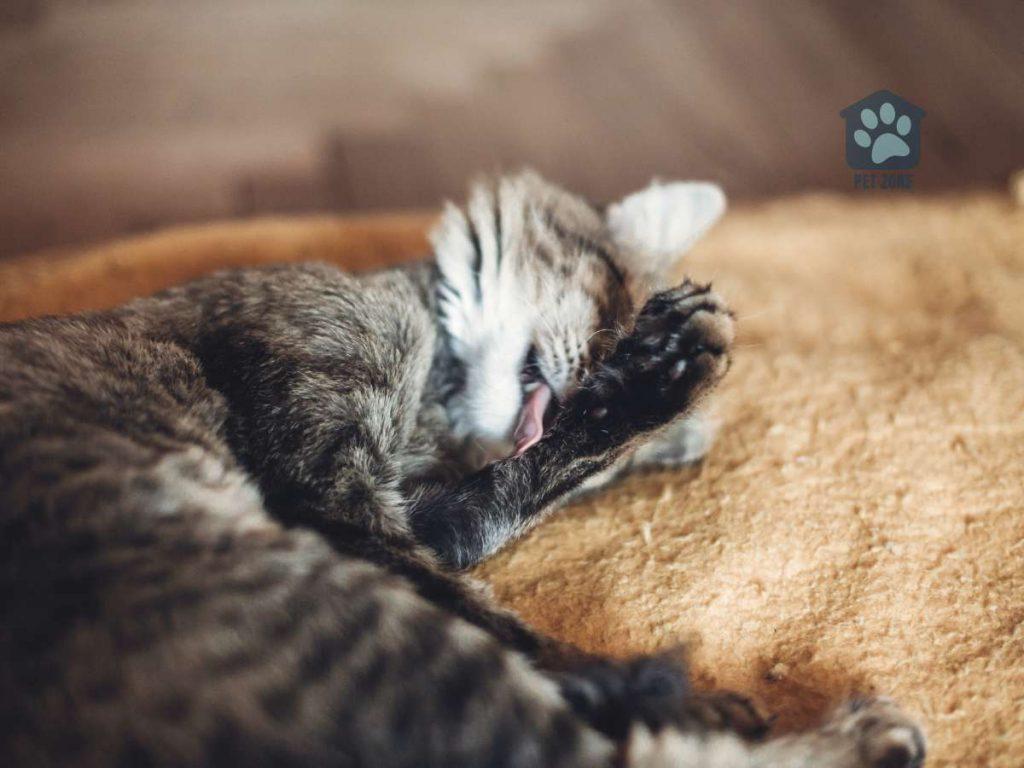
How to Stop Your Cat from Licking Blankets
While blanket licking can be harmless, there might be times when you want to redirect this behavior, especially if it leads to potential harm or if your favorite blanket is at stake. Here’s how you can guide your feline friend:
Provide Alternatives
Offer toys or ‘lick mats’ designed for cats. These mats can give the same satisfying texture that cats crave without risking your blankets.
Increase Playtime
Engage your cat in play sessions using toys. A tired cat is less likely to indulge in excessive licking. Ensure you set aside time to play with your feline daily.
Safe Deterrents
Use safe, cat-friendly sprays on your blankets. These deter cats from licking without harming them.
Create a Distraction
If you notice your cat about to start licking, distract them with a toy or call them to a different activity.
Take Your Cat for Walks
Some cats benefit from the stimulation of the outside world. Use a cat harness and take your cat for short walks. This can reduce their need to engage in repetitive behaviors indoors.
Consult a Veterinarian
If you’ve tried multiple strategies and your cat keeps returning to the behavior, or if you suspect your cat is sick, consult a vet. They can offer insights into any underlying issues and suggest specific interventions.
Remember, while you might want to stop the behavior, it’s essential to approach the situation with patience and understanding. Forceful or negative reactions can stress your cat and exacerbate the problem.
Conclusion: Embracing the Quirks of Your Feline Friend
Every cat is unique, with its set of behaviors and quirks. Licking blankets, for some, is just a part of who they are. As a cat owner, you get a front-row seat to these fascinating habits. While some behaviors might seem odd, they often have deep-rooted reasons, from early kittenhood memories to simple texture preferences.
However, always be observant. If your cat’s blanket licking becomes excessive or if they begin to consume fabric, it’s time to take action. Consult with a vet, understand the possible reasons, and try strategies to redirect their focus. But in most cases, a cat licking a blanket is just them being their unique selves.
Please share your thoughts in the comments below and don’t forget to spread the word on social media!
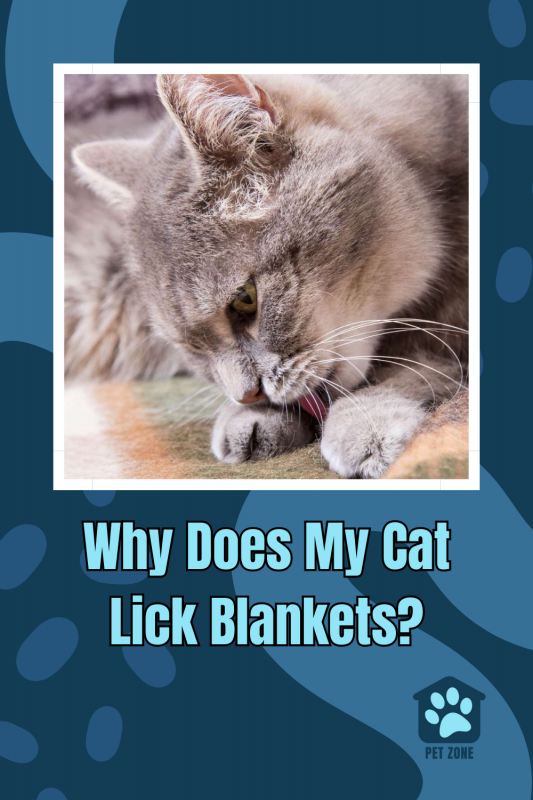


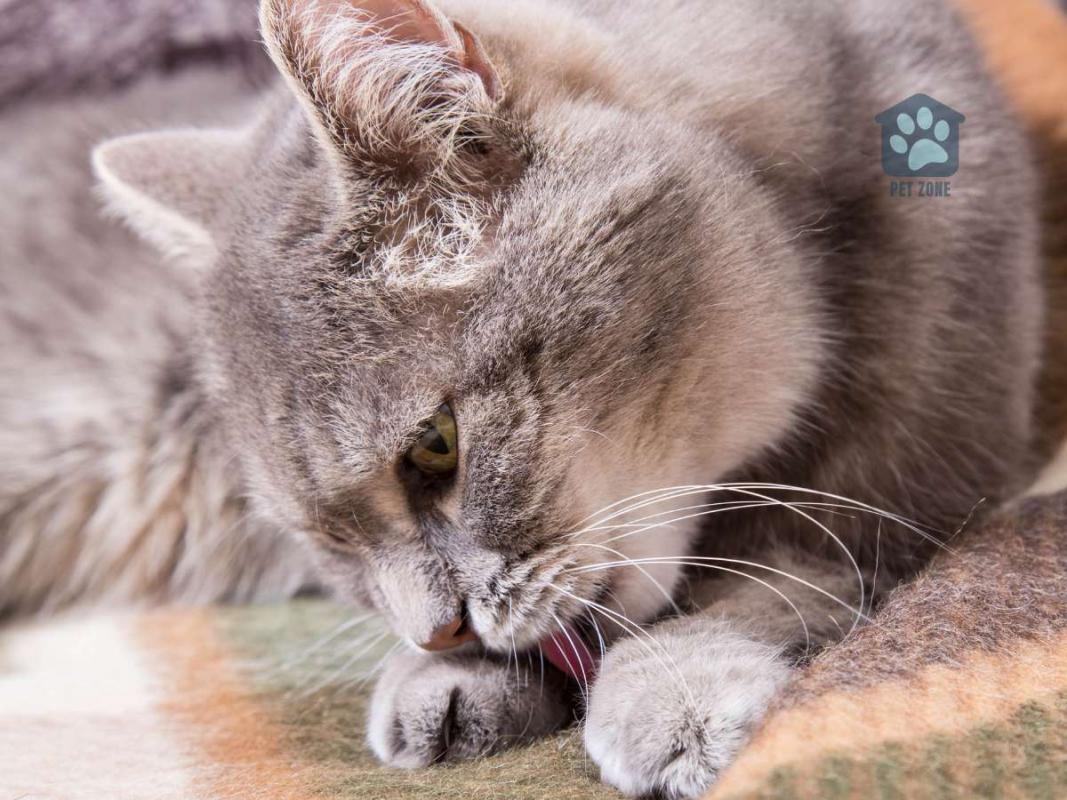
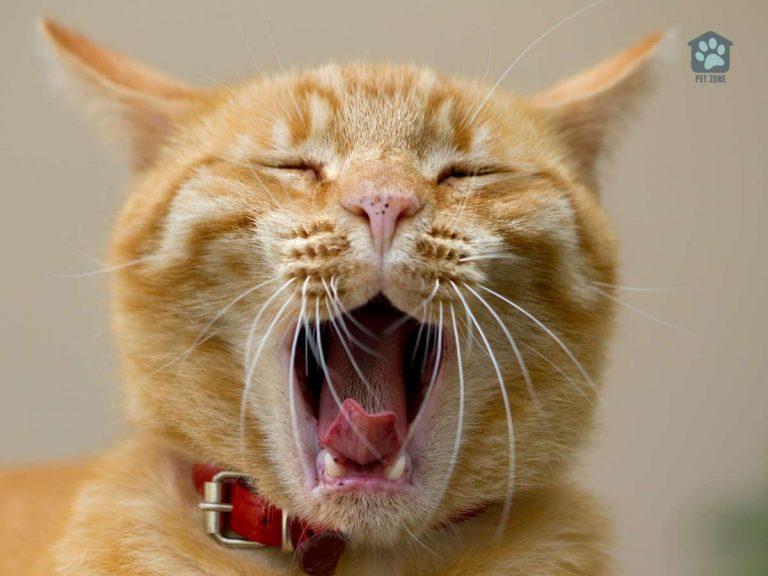
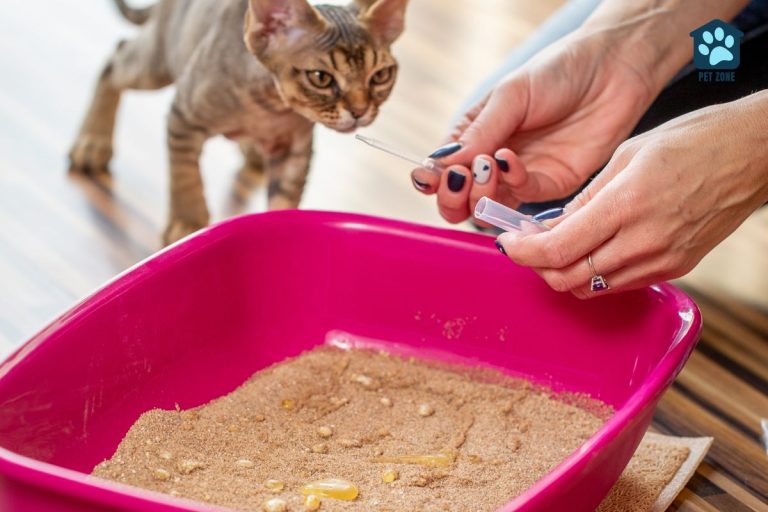

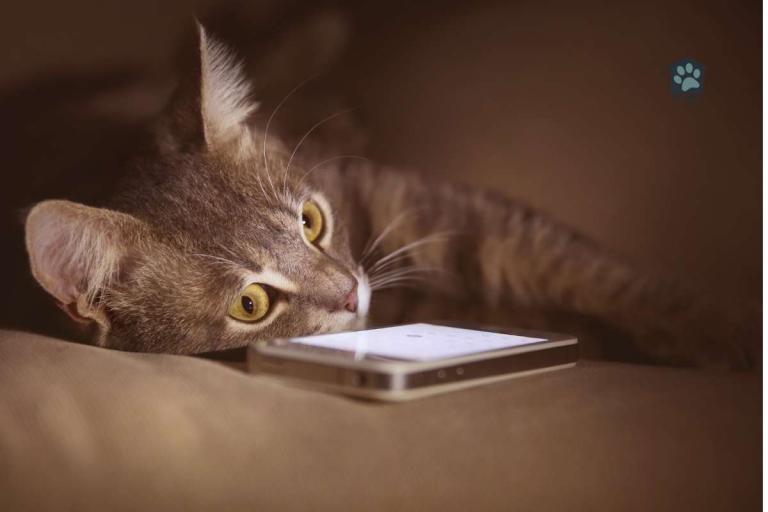
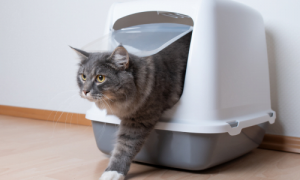
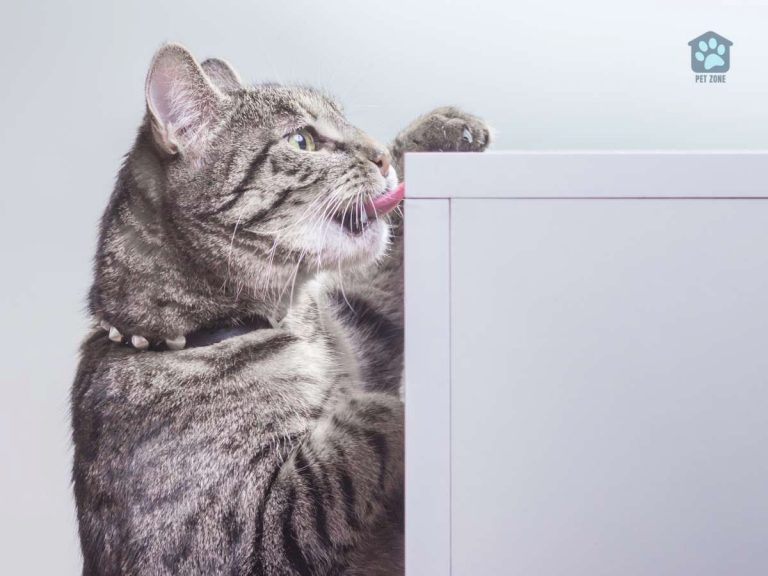
So interesting! My cat licks everything. The floor, even me some times.